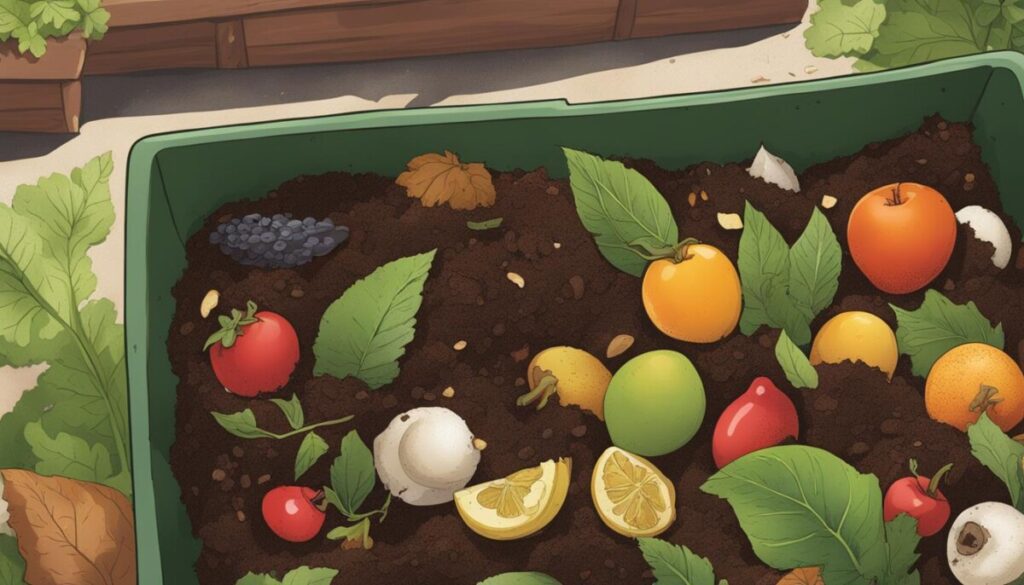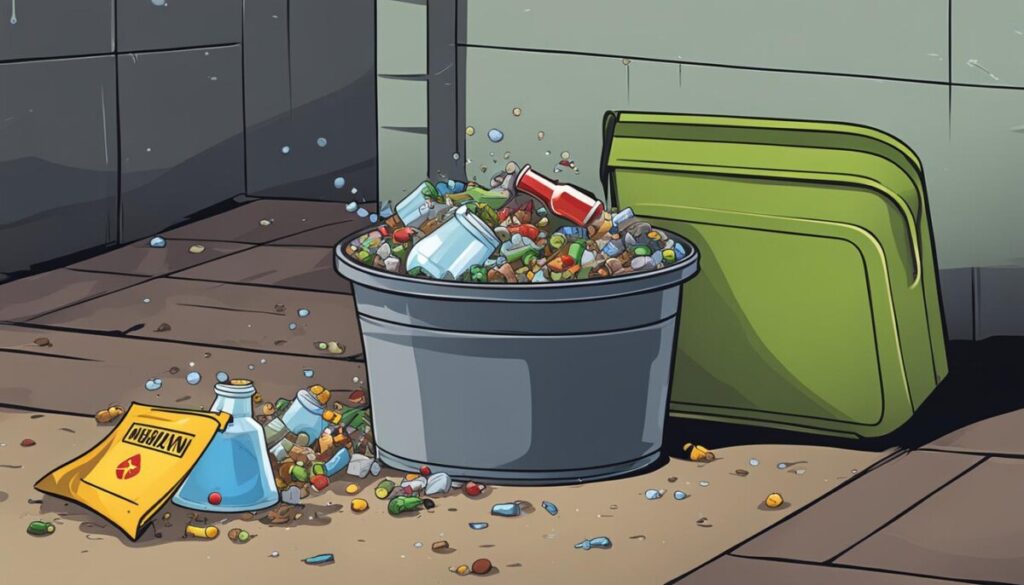Table of Contents
Composting with worms, also known as vermiculture, is a fantastic way to create nutrient-rich fertilizer for your garden while reducing organic waste. However, it’s essential to understand what not to put in a worm compost bin to ensure the health and growth of your worms, as well as the efficiency of the composting process.
When it comes to worm compost bins, not all organic waste is suitable for composting. Certain materials, such as meat, dairy, and oily food scraps, can attract pests and create an unpleasant odor. Additionally, citrus fruits can be too acidic for worms, while large pieces of wood or paper can take too long to break down.
Another crucial aspect of maintaining a worm compost bin is proper worm bin maintenance. This includes regularly checking the moisture levels, balancing the carbon and nitrogen ratios, and avoiding overfeeding. Neglecting these factors can lead to a decrease in the efficiency of the composting process and the health of your worms.
Key Takeaways:
- Not all types of organic waste are suitable for composting with worms
- Avoid adding meat, dairy, oily food scraps, citrus fruits, large pieces of wood or paper, and other non-compostable materials to your worm compost bin
- Proper worm bin maintenance is crucial for optimal composting conditions
- Regularly check moisture levels, balance carbon and nitrogen ratios, and avoid overfeeding your worms
- By avoiding harmful substances and non-compostable materials, you can maintain a safe and healthy environment for your worms and produce high-quality compost
The Impact of Organic Waste on Worm Compost Bins
Worm composting is a fantastic way to reduce organic waste while producing nutrient-rich fertilizer for your garden. However, not all organic waste should be added to your worm bin. Here are some tips for avoiding materials that can negatively impact your worm compost bin:
- Avoid meat and dairy products: These materials are too difficult for worms to break down and can attract unwanted pests to your compost bin.
- Avoid oily food scraps: Oil can coat the worm’s body and harm their ability to breathe, leading to a decline in their health.
- Avoid citrus fruits: These fruits are acidic and can harm the worms, disrupting the pH balance in their environment.
So, what can you add to your worm compost bin? Here are some options:
- Fruit and vegetable scraps: These materials are perfect for worm composting and can break down quickly, providing ample nutrition for your worms.
- Eggshells: Crushed eggshells can help to balance the pH in your worm bin and provide calcium for the worms.
- Coffee grounds and tea leaves: Worms love coffee and tea! These materials break down quickly and provide nitrogen-rich nutrients for your compost.
Remember to balance the amount of carbon and nitrogen-rich materials in your worm bin to keep your compost healthy. Too much of either can lead to issues such as foul odors or slow decomposition. You can also add a layer of bedding, such as shredded newspaper or cardboard, to your worm bin to keep moisture levels optimal and provide a comfortable environment for your worms.

“Worm composting is a great way to reduce organic waste and produce nutrient-rich fertilizer for your garden.”
Using worm castings in your garden can also provide numerous benefits, such as improving soil structure and increasing plant growth. By understanding what organic waste to add to your worm compost bin and how to monitor the condition of your compost, you can effectively produce high-quality worm castings for your gardening needs.
Common Mistakes in Worm Composting
Worm composting, also known as vermicomposting, is an effective way to turn organic waste into nutrient-rich fertilizer. However, like any other gardening practice, there are common mistakes that can hinder the success of your worm bin. Here are some worm bin troubleshooting tips to help you avoid these common mistakes:
1. Overfeeding
One of the most common mistakes in composting with worms is overfeeding. While it may seem like a good idea to add more organic waste to speed up the process, worms can only consume so much food. Overfeeding will not only slow down the decomposition process but can also lead to unpleasant odors, mold growth, and the attraction of pests. To avoid overfeeding, make sure to add small amounts of organic waste regularly.
2. Improper Moisture Levels
Worms need a moist environment to survive and decompose organic waste effectively. However, too much moisture can lead to a lack of oxygen and the development of harmful bacteria. On the other hand, insufficient moisture levels can cause the worms to dry out and die. To maintain optimal moisture levels, make sure to monitor the bedding regularly and adjust as needed. A good rule of thumb is to keep the bedding as moist as a wrung-out sponge.
3. Neglecting to Balance Carbon and Nitrogen Ratios
A balanced carbon to nitrogen ratio is essential for healthy worm composting. Carbon-rich materials such as shredded paper, cardboard, and dry leaves provide bedding for the worms and help maintain moisture levels. Nitrogen-rich materials such as vegetable scraps, coffee grounds, and eggshells provide food for the worms. Neglecting to balance carbon and nitrogen ratios can lead to slow decomposition and unpleasant odors. To ensure a proper balance, aim for a ratio of 3:1 carbon to nitrogen.
4. Mishandling the Worm Bin
Mishandling the worm bin can also hinder the success of your composting. For example, shaking or disturbing the bedding can stress out the worms and disrupt their natural behavior. To avoid mishandling the worm bin, make sure to handle it gently and avoid moving it frequently. Additionally, avoid exposing the worm bin to extreme temperatures or direct sunlight.
5. Not Harvesting Worm Castings
Worm castings are the nutrient-rich fertilizer produced by worms during composting. Neglecting to harvest worm castings can lead to overpopulation and can make the bedding too acidic, which is harmful to the worms. To harvest worm castings, simply remove the top layer of bedding and collect the castings from the bottom. You can then add fresh bedding and organic waste back into the worm bin.
By avoiding these common mistakes and composting with worms correctly, you can produce high-quality worm castings for your gardening needs.
Harmful Substances and Non-Compostable Materials
When it comes to worm composting, there are certain materials that should never be added to the worm compost bin. These substances can not only harm the worms but can also negatively impact the quality of the compost produced. Make sure to avoid the following:
1. Pesticides and Herbicides
Never add any materials that have been treated with pesticides or herbicides to your worm compost bin. These chemicals can be harmful to the worms and can also linger in the compost. This can be detrimental to your garden, as the chemicals can harm your plants and contaminate the soil.
2. Plastics and Synthetic Materials
Items such as plastics, synthetic fabrics, or even dryer sheets should never be added to a worm compost bin. These materials will not break down and will only take up valuable space in the bin. Additionally, plastics can release harmful chemicals as they break down, which can harm the worms and contaminate the compost.
3. Meat and Dairy Products
While a small amount of meat or dairy can be added to a traditional compost pile, these items should never be added to a worm compost bin. Worms do not have the ability to break down animal proteins, and these items can quickly become rancid and attract pests.
4. Citrus Fruits and Oily Foods
While fruits and vegetables are great additions to a worm compost bin, citrus fruits and oily foods should be avoided. Citrus is too acidic for worms, and oily foods can suffocate them by clogging their pores.
By avoiding these harmful substances and non-compostable materials, you can help ensure the health and well-being of your worms and produce high-quality compost.

Conclusion
In summary, it is vital to understand what not to put in a worm compost bin to ensure the health and productivity of your worms. By avoiding organic waste that can harm them and refraining from adding harmful substances or non-compostable materials, you can produce nutrient-rich worm castings for your gardening needs.
Keeping a balance of carbon and nitrogen ratios, proper moisture levels, and avoiding overfeeding can help avoid common mistakes in vermicomposting. Regular maintenance of your worm bin will help maintain optimal conditions, ensure the success of your worm composting endeavors, and provide numerous benefits for your garden and landscaping needs.
Thank you for reading our informative guide on what not to put in a worm compost bin. We hope it has provided you with helpful tips on maintaining a healthy and productive worm bin. Happy composting!
FAQ
What should not be put in a worm compost bin?
It is important to avoid putting meat, dairy, oily food scraps, and citrus fruits in a worm compost bin. These materials can be harmful to the worms and can affect the overall efficiency of the composting process.
What is the impact of organic waste on worm compost bins?
Organic waste, if not properly managed, can negatively impact worm compost bins. Certain materials like meat, dairy, oily food scraps, and citrus fruits should be avoided. Instead, focus on composting vegetable scraps, coffee grounds, tea leaves, and shredded paper for optimal results.
What are some common mistakes in worm composting?
Some common mistakes in worm composting include overfeeding the worms, improper moisture levels, and neglecting to balance carbon and nitrogen ratios. It is important to find the right balance to ensure the success of your composting efforts.
What substances and materials should not be added to a worm compost bin?
Harmful substances such as pesticides, herbicides, plastics, and synthetic materials should never be added to a worm compost bin. These can have detrimental effects on the worms and compromise the quality of the compost produced.
Why is it important to understand what not to put in a worm compost bin?
Understanding what not to put in a worm compost bin is crucial for the health of the worms and the quality of the compost produced. By avoiding harmful materials and maintaining the right conditions, you can ensure the success of your composting efforts and produce nutrient-rich worm castings for your garden.

Pingback: Growing your worm population in the compost bin
Pingback: Discover If Worms Can Live in a Compost Bin: Home Eco-Tips
Pingback: Easy Compost Usage Guide for Beginners
hey there and thank you for your information – I have definitely picked up something new from right here. I did however expertise some technical issues using this site, since I experienced to reload the web site a lot of occasions prior to I may get it to load properly. I had been pondering in case your hosting is OK? No longer that I am complaining, however sluggish loading instances instances will sometimes have an effect on your placement in google and can injury your quality rating if advertising and ***********|advertising|advertising|advertising and *********** with Adwords. Anyway I’m adding this RSS to my email and could look out for much extra of your respective fascinating content. Make sure you replace this again very soon..
As a Newbie, I am always exploring online for articles that can benefit me. Thank you
Keep functioning ,terrific job!
Hi, i think that i saw you visited my website so i came to “return the favor”.I am attempting to find things to enhance my website!I suppose its ok to use a few of your ideas!!
Hiya, I’m really glad I’ve found this information. Nowadays bloggers publish just about gossips and internet and this is really frustrating. A good blog with exciting content, this is what I need. Thank you for keeping this site, I’ll be visiting it. Do you do newsletters? Cant find it.